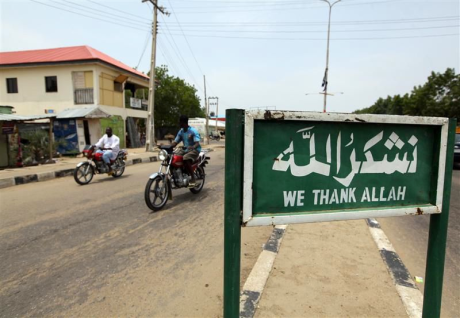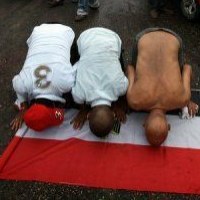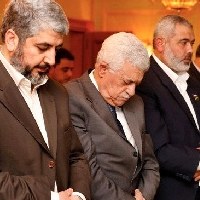![]()
RubinReports | By Barry Rubin

An Islamic signboard is seen along a road in Nigeria's remote northeastern Borno state, June 29, 2011. (REUTERS/Afolabi Sotunde)
In a recent article, “The Shar’iah Question in northern Nigeria and the Failure of Political Islam,” South African scholar Hussein Solomon makes a wonderful point about what happens when political ideology meets real people.
In northern Nigeria, 12 states adopted Shariah law between the years 1999 and 2003. One of the main reasons for these measures enjoying popular support, aside from the fact that most of the population is Muslim, was concern over rising crime. So what happened? According to Solomon:
— Vigilante groups, called Yan Hizba, formed nominally to implement Shariah law but were actually vigilante groups using threats and violence to enrich themselves and attack rivals in their neighborhoods.
— Defendants being charged by Shariah courts were tortured in order to extract confessions, after which the victims were convicted.
— Most of those convicted before Shariah courts were poor or female, in other words they were those who couldn’t buy their way out or, in the latter case, were treated in an unequal manner.
— While prostitution was harshly punished, Muslim males simply went short distances to places where Shariah law didn’t apply, while those who wanted to drink alcohol were able to purchase counterfeit identity cards saying they were Christians.
There are three things to be learned from this failure.
First, in Nigeria it led to the formation of even more extreme Islamist groups using terrorism, Boko Haram, that insisted Shariah be more strictly and universally implemented, Western-style education and even aspects of medicine should be banned completely, and murdering Christians. Remember that Christians were being killed not only for all the other reasons but because their presence made it harder to implement Shariah laws on the Muslim population.
Second, the more radical Islamists — nowadays called Salafists in the Middle East — pressure allegedly “moderate” (albeit in tactics only) Islamists to take a harder line. And since the “moderates,” often Muslim Brothers, have the same goals, don’t want to lose their constituencies to rivals, and believe that one cannot be too slack in implementing the word of Allah, they become harder-line in practice.
Third, frustrated that people don’t obey them when they make recommendations (even backed by intimidation), Islamists feel pressed to seize state power and establish what amounts to a dictatorship — whether elected or not — because this is the only way to implement their all-embracing, supposedly divinely dictated social program. This probably won’t occur in Nigeria as a whole but might take place in some of its states. And there are a half-dozen Middle Eastern countries where this is in the process of happening.
Thus, terrorism and totalitarianism are two strategies for Islamists that are mutually reinforcing. A reformist, electoral-oriented approach is followed only as long as the revolutionary Islamists have a reasonable expectation that this way will bring them to total victory. If a “soft” approach is seen as failing they will escalate.
Oh, there’s one more point. The U.S. State Department has said that Boko Haram is not Islamist. that’s as ridiculous than last year’s statement by the U.S. head of intelligence that the Muslim Brotherhood is secular. It’s part of the same pattern of denial. The only way to defeat revolutionary Islamism is to defeat it and few of those in power in the West seems interested in doing so nowadays.



 RSS
RSS










Latest Comments
Hello Mike, Thank you for your positive feedback to the article. I felt there wasn’t too much critical analysis of ...
Thanks for this considered and well constructed article. A follow up article on the manner in which the editorial contro...
THE CLUELESSNESS OF CLAIMING THAT OBAMA'S MIDDLE EAST POLICIES WERE A FAILURE CANNOT BE FURTHER FROM THE TRUTH, WHAT THE...
As long as Obama is the president of the usa do not trust the us government......
Thank you for an good read....